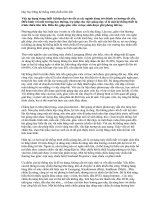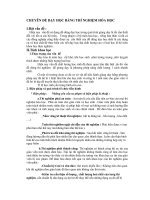Day hoc bang tra cuu 1
Bạn đang xem bản rút gọn của tài liệu. Xem và tải ngay bản đầy đủ của tài liệu tại đây (167.36 KB, 48 trang )
<span class='text_page_counter'>(1)</span><div class='page_container' data-page=1>
Inquiry-Based Teaching
<b>Dạy học bằng tra cứu</b>
A Workshop for the
Center for Professional Development
School of Education, Can Tho University
<b>TẬP HUẤẤN </b>
<b>TRUNG TẤM PHÁT TRIỂỂN NGHIỆP VỤ SƯ PHẠM</b>
<b>Khoa Sư phạm – Đại học Cầần Thơ</b>
<b>John M. Dirkx, Ph.D.</b>
</div>
<span class='text_page_counter'>(2)</span><div class='page_container' data-page=2>
Workshop Goals
<b>Mục tiêu lớp tập huầẤ</b>
<b>n</b>
• To foster use of inquiry-based methods in
participants’ teaching practices
<b>Thúc đầỂy việc sưỂ dụng phương pháp </b>
<b>dạy học tra cứu</b>
• To promote professional development &
lifelong long of workshop participants
</div>
<span class='text_page_counter'>(3)</span><div class='page_container' data-page=3>
Get Acquainted
</div>
<span class='text_page_counter'>(4)</span><div class='page_container' data-page=4>
Institutions
<b>Các đơn vị tham dự</b>
• Community College?
<b>Cao đăỂng cộng đốầng?</b>
• Job Training Center?
<b>TT Dạy nghêầ & Giới thiệu việc làm?</b>
• University?
<b>Trường Đại học?</b>
• Vocational School?
</div>
<span class='text_page_counter'>(5)</span><div class='page_container' data-page=5>
Years Teaching or in Education
<b>SốẤ năm giaỂng dạy/cống tác trong ngành GD</b>
• Less than two years?
<b>Ít hơn 2 năm?</b>
• Two years to five years?
<b>2 năm đêẤn 5 năm?</b>
• Five years to ten years?
<b>5 năm đêẤn 10 năm?</b>
• More than ten years?
</div>
<span class='text_page_counter'>(6)</span><div class='page_container' data-page=6>
Participant
Needs Assessment
<b>Đánh giá nhu cầầu người tham dự hội thaỂo</b>
• In small groups: Trong nhóm nhoỏ:
– Introduce yourself and the role you play in your
institution
<b>Giới thiệu baỂn thần và vai trò cuỂa bạn </b>
<b>trong cơ quan</b> <b> </b>
– Courses you teach
<b>Các mốn học đang giaỂng dạy</b>
– What you are expecting to get out of the workshop
</div>
<span class='text_page_counter'>(7)</span><div class='page_container' data-page=7>
Large Group Sharing
<b>Chia sẻ</b>
<b>Ể với ca</b>
<b>Ể lớp</b>
• Select a group member to share group’s
expectations for the workshop
</div>
<span class='text_page_counter'>(8)</span><div class='page_container' data-page=8>
Our Methods
<b>Phương pháp trình bày</b>
• Provide information related to inquiry-based
teaching
<b>Giới thiệu phương pháp dạy học bằng tra cứu</b>
• Enhance your understanding of inquiry-based
teaching
<b>Nầng cao hiêỂu biêẤt vêầ PP dạy học bằng tra </b>
<b>cứu</b>
• Practice designing lessons using inquiry-based
teaching
</div>
<span class='text_page_counter'>(9)</span><div class='page_container' data-page=9>
Our Participants
<b>Người tham dự</b>
Vocational Schools
<b>Các trường dạy nghêầ</b>
Community Colleges
<b>Các trường cao đăỂng cộng đốầng</b>
Universities
<b>Các trường đại học </b>
Job Training Centers
</div>
<span class='text_page_counter'>(10)</span><div class='page_container' data-page=10>
Our Project
<b>KêẤ</b>
<b> hoạch</b>
Develop an inquiry-based lesson plan
within your subject area
</div>
<span class='text_page_counter'>(11)</span><div class='page_container' data-page=11>
<b>Proposed Schedule for the Workshop</b>
<b>Lịch làm việc</b>
• Day 1: What is inquiry-based teaching and its
methods?
<b>Ngày 1: Dạy học bằng tra cứu là gì và PP dạy? </b>
<b> </b>
• Day 2: How do we use inquiry-based teaching
methods?
<b>Ngày 2: Làm thêẤ nào vận dụng PP này?</b>
• Day 3: Practice developing lesson plans using
inquiry-based teaching
</div>
<span class='text_page_counter'>(12)</span><div class='page_container' data-page=12>
What is Inquiry-based
Teaching
</div>
<span class='text_page_counter'>(13)</span><div class='page_container' data-page=13>
Definition of
Inquiry-Based Teaching
<b>Định nghĩa: Dạy học bằng tra cứu</b>
“the creation of a classroom where students
are engaged in essentially open-ended,
student-centered activities.”
Colburn, 2000
“<b>tạo nên một lớp học trong đó học sinh </b>
<b>tham gia tích cực vào các hoạt động mơỂ, </b>
<b>lầẤy SV làm trung tầm”</b>
</div>
<span class='text_page_counter'>(14)</span><div class='page_container' data-page=14>
Definition of
Inquiry Based Teaching
<b>Định nghĩa: Dạy học bằng tra cứu</b>
• A teaching technique in which teacher creates
situations that require students to solve problems
<b>Giáo viên tạo nên tình huốẤng địi hoỂi SV </b>
<b>phaỂi giaỂi quẤt vầẤn đêầ</b>
• Students make use of prior knowledge, use their own
questions, and design experience to address these
questions
</div>
<span class='text_page_counter'>(15)</span><div class='page_container' data-page=15>
What is Inquiry-Based Teaching?
<b>Dạy học bằng tra cứu là gì?</b>
• Encourages learners to be self-directed
<b>KhuẤn khích người học tự định hướng</b>
• Builds research skills to be used throughout
life
<b>Phát triêỂn kỹ năng nghiên cứu</b>
• Students determine own learning needs
through a contract
</div>
<span class='text_page_counter'>(16)</span><div class='page_container' data-page=16>
Approaches to
Inquiry-based Teaching
<b>Các phương pháp dạy học bằng </b>
<b>tra cứu</b>
Structured inquiry
<b>Tra cứu thẻo khuốn khốỂ </b>
Guided inquiry
<b>Tra cứu có hướng dầẫn</b>
Open inquiry
<b>Tra cứu mơỂ rộng / khống hạn chêẤ</b>
Learning cycle
</div>
<span class='text_page_counter'>(17)</span><div class='page_container' data-page=17>
Teacher-centered
GV là trung tâm
Learning centered
HS là trung tâm
<b>Teacher takes </b>
<b>more responsibility/GV chịu trách nhiệm nhiều hơn</b> <b>more responsibility/Student takes SVchịu trách nhiệm </b>
<b>nhiều hơn</b>
<---
|--- >
Lecture
Course
<b>Thuyết </b>
<b>giảng</b>
Self-Paced Course
<b>Tự điều chỉnh </b>
<b>tốc độ </b>
Simulation
Role Play
<b>Tạo tình huống</b>
<b>đóng vai</b>
<b>Inquiry </b>
<b>Problem -Based Learning</b>
<b>Học bằng </b>
<b>tra cứu</b>
True Self
-Directed Learning
</div>
<span class='text_page_counter'>(18)</span><div class='page_container' data-page=18>
Examples
<b>Ví dụ</b>
• Geography students want to learn more about climate
change in their area
<b>SV ngành địa lý muốẤn tìm hiêỂu vêầ sự thay đốỂi khí </b>
<b>hậu ơỂ địa phương</b>
• English students want to know how students in other
countries learn English
<b>SV Anh văn muốẤn tìm hiêỂu xẻm sinh viên các nước </b>
<b>khác học tiêẤng Anh thêẤ nào</b>
• Math students want to study effectiveness of different
ways of learning math
</div>
<span class='text_page_counter'>(19)</span><div class='page_container' data-page=19>
Break
</div>
<span class='text_page_counter'>(20)</span><div class='page_container' data-page=20>
How might you use an inquiry-based approach
in your teaching?
<b>Làm thêẤ nào vận dụng PP dạy học bằng tra </b>
<b>cứu?</b>
• Write down some preliminary ideas
<b>Hãy viêẤt vài ý tươỂng cuỂa bạn</b>
• Share these ideas with a small group of
two others
</div>
<span class='text_page_counter'>(21)</span><div class='page_container' data-page=21>
Large Group Sharing of Preliminary
Ideas of Using Inquiry-based Approach
to Teaching
</div>
<span class='text_page_counter'>(22)</span><div class='page_container' data-page=22>
Why should we consider using
inquiry-based approaches?
<b>Tại sao chúng ta nên nghĩ đêẤn </b>
<b>việc sưỂ dụng các hình thức dạy </b>
</div>
<span class='text_page_counter'>(23)</span><div class='page_container' data-page=23>
From Teaching to Learning
<b>Từ dạy đêẤ</b>
<b>n học</b>
• Emphasis on what students are learning
rather than what we are teaching
<b>NhầẤn mạnh vào những gì SV học hơn </b>
<b>là những gì chúng ta dạy</b>
• Research on how students learn,
individual differences and diversity
</div>
<span class='text_page_counter'>(24)</span><div class='page_container' data-page=24>
National Academy of Sciences - Students learn
when they:
<b>Viện hàn lầm khoa học quốẤc gia – SV học </b>
<b>khi:</b>
• Question
<b>HoỂi</b>
• Investigate
<b>Tìm tịi nghiên cứu</b>
• Use evidence to describe, explain, and predict
<b>SưỂ dụng các chứng cứ đêỂ mố taỂ, giaỂi thích và dự </b>
<b>đốn</b>
• Connect evidence to knowledge; and
<b>Liên hệ các chứng cứ với kiêẤn thức</b>
• Share findings
</div>
<span class='text_page_counter'>(25)</span><div class='page_container' data-page=25>
Importance of Lifelong learning
<b>Tầầm quan trọng cuỂa việc học tập </b>
<b>suốẤt đời</b>
• Learning to learn is increasingly
important
<b>Học cách học đang ngày càng trơỂ nên </b>
<b>quan trọng</b>
• Being able to learn throughout one’s
lifetime and career
</div>
<span class='text_page_counter'>(26)</span><div class='page_container' data-page=26>
Concern for Outcomes
<b>Quan tầm đêẤ</b>
<b>n kêẤ</b>
<b>t qua</b>
<b>Ể</b>
• Are students learning what we intend and
what society needs?
<b>SV có học những gì mà chúng ta muốẤn </b>
<b>và những gì mà xã hội cầần?</b>
• Can students apply what they are learning
to the world and the workplace?
</div>
<span class='text_page_counter'>(27)</span><div class='page_container' data-page=27>
Benefits of Inquiry-based Teaching
<b>Lợi ích cuỂa PP dạy học bằng tra cứu</b>
• Improves student attitude and
achievement
<b>Giúp SV có thái độ học tập và kêẤt </b>
<b>quaỂ học tập tốẤt hơn</b>
• Facilitates understanding
<b>Giúp SV hiêỂu bài dêẫ dàng hơn</b>
• Encourages critical thinking
</div>
<span class='text_page_counter'>(28)</span><div class='page_container' data-page=28>
Review of Morning Work
<b>Những nội dung đã học sáng nay</b>
• Our goal: Developing an inquiry-based lesson plan
<b>Mục tiêu: Soạn giáo án PP dạy học bằng tra </b>
<b>cứu</b>
• What do we mean by inquiry-based teaching?
<b>PP dạy học bằng tra cứu là gì?</b>
• Why is inquiry-based teaching important?
<b>Tại sao PP dạy học bằng tra cứu quan trọng?</b>
• How might we use inquiry-based methods in our
teaching?
</div>
<span class='text_page_counter'>(29)</span><div class='page_container' data-page=29>
Lunch !!
</div>
<span class='text_page_counter'>(30)</span><div class='page_container' data-page=30>
Beginning the Lesson Plan
Bắắ
t đầầ
u soạn giáo án
• Individually:
Cá nhần
– What topic of your subject would be appropriate
for using an inquiry-based approach?
– Trong môn dạy cuỏa bạn, chuỏ đềầ nào phù hợp
với việc dạy học theo hướng tra cứu?
• Share your topic in small groups of three
</div>
<span class='text_page_counter'>(31)</span><div class='page_container' data-page=31>
Large Group Sharing
Chia se
ỏ với ca
ỏ lớp
• Topics you are considering for using
inquiry-based methods
• Chia seỏ với caỏ lớp các chuỏ đềầ
</div>
<span class='text_page_counter'>(32)</span><div class='page_container' data-page=32>
Overview of Inquiry-based
Teaching and Learning
Tôỏ
ng quan vềầ
dạy và học
</div>
<span class='text_page_counter'>(33)</span><div class='page_container' data-page=33>
Characteristics of
Inquiry-based Teaching
Những đặc điềỏ
m
• Creates opportunities to engage people in
active learning based on their own questions
• <b>Tạo cơ hội lối cuốẤn người học tích cực học tập, </b>
<b>dựa trên các cầu hoỂi người học tự đặt ra</b>
• Learner centered and learner driven
• <b>LầẤy SV làm trung tầm và xuầẤt phát từ SV</b>
• Stresses active learning
</div>
<span class='text_page_counter'>(34)</span><div class='page_container' data-page=34>
Characteristics of
Inquiry-Based Teaching
Những đặc điềỏ
m
• Question driven more than by topic or thesis
• <b>XuầẤt phát từ việc đặt cầu hoỂi hơn là thẻo chuỂ đêầ</b>
<b>hoặc đêầ tài nghiên cứu</b>
• Begin with a general theme or question as
starting point
• <b>KhơỂi đầầu bằng một chuỂ điêỂm hoặc một cầu hoỂi khái </b>
<b>quát đêỂ làm xuầẤt phát điêỂm</b>
• Consists of a cycle of a question that leads to
inquiry and then to more questions
</div>
<span class='text_page_counter'>(35)</span><div class='page_container' data-page=35>
Characteristics of
Inquiry-Based Teaching
<b>Những đặc điêỂ</b>
<b>m</b>
• Emphasizes and coaches the asking of good
questions
• <b>NhầẤn mạnh và hướng dầẫn việc đặt ra những cầu hoỂi </b>
<b>hiệu quaỂ</b>
• Provides some process to help students monitor
progress
• <b>Hướng dầẫn các bước đêỂ giúp SV giám sát tiêẤn trình </b>
<b>làm việc</b>
• Uses instructor as a resource and to model
effective inquiry and reflection
</div>
<span class='text_page_counter'>(36)</span><div class='page_container' data-page=36>
Reflection Activity
Hoạt động phaỏn hơầi
• Individual work
– Write down what characteristics of
inquiry-based teaching you now use in your teaching
– <b>Hãy viêẤt ra những đặc điêỂm cuỂa học tập tra cứu </b>
<b>mà bạn đang sưỂ dụng trong giaỂng dạy</b>
• Large group
– Share with large group how your teaching
reflects some characteristics of inquiry
</div>
<span class='text_page_counter'>(37)</span><div class='page_container' data-page=37>
Some Theories Important to
Inquiry-based Teaching
Một sôắ
lý thuyềắ
t quan trọng
Experiential learning theory
<b>Lý thuyêẤt học từ traỂi nghiệm</b>
Self-directed learning theory
</div>
<span class='text_page_counter'>(38)</span><div class='page_container' data-page=38>
Role of
Experience in Learning
<b>Vai trò cuỂa kinh nghiệm trong q trình </b>
<b>học</b>
• Students prior knowledge and experience is
important in learning
• <b>KiêẤn thức và kinh nghiệm đã có cuỂa SV có vai </b>
<b>trị rầẤt quan trọng đốẤi với việc học</b>
• Students learn from and through their experience
• <b>SV học từ kinh nghiệm và thống qua kinh </b>
<b>nghiệm</b>
• Learning by doing is a powerful way to learn
</div>
<span class='text_page_counter'>(39)</span><div class='page_container' data-page=39>
Theory of
Experiential Learning
(David Kolb)
Experience
<b>TraỂi nghiệm</b>
Reflect and
Observe
<b>Suy ngẫm</b>
<b>và Quan sát</b>
</div>
<span class='text_page_counter'>(40)</span><div class='page_container' data-page=40>
Questions??
</div>
<span class='text_page_counter'>(41)</span><div class='page_container' data-page=41>
Break
</div>
<span class='text_page_counter'>(42)</span><div class='page_container' data-page=42>
Self-directed Learning Theory
<b>Lý thuyêẤ</b>
<b>t học tự định hướng</b>
• Learner’s can develop ability to direct their own
learning
• <b>Người học có thêỂ phát triêỂn khaỂ năng tự định </b>
<b>hướng việc học tập cuỂa baỂn thần</b>
• Learner’s vary in their readiness to be
self-directed
• <b>Mức độ săẫn sàng cho việc học tự định hướng cuỂa SV </b>
<b>khác nhau</b>
• Teacher’s role varies with the readiness of the
leaner to be self-directed
</div>
<span class='text_page_counter'>(43)</span><div class='page_container' data-page=43>
Stages of
Self-directed Learning
<b>Các giai đoạn tự định hướng</b>
• One:
– Student is dependent; teacher is authority
and coach
– <b><sub>SV phụ thuộc vào GV;</sub></b> <b><sub>GV điêầ</sub><sub>u khiêỂ</sub><sub>n</sub></b>
• Two:
– Student is interested; teacher is motivator
or guide
</div>
<span class='text_page_counter'>(44)</span><div class='page_container' data-page=44>
Stages of
Self-directed Learning
<b>Các giai đoạn tự định hướng</b>
• Three:
– Student is involved; teacher is a facilitator
– <b>SV tham gia;</b> <b>GV tạo điêầu kiện thuận lợi</b>
• Four:
– Student is self-directed; teacher is
consultant or delegator
</div>
<span class='text_page_counter'>(45)</span><div class='page_container' data-page=45>
Review
<b>Tóm tắt</b>
• Characteristics of inquiry-based teaching
<b>Các </b><b>đặc điêỂm cuỂa dạy học bằng tra cứu</b>
• Importance of experience in the learning
process
<b>Vai trị quan trọng cuỂa sự traỂi nghiệm trong </b>
<b>q trình học</b>
• Emphasis of self-directedness of the
learning process
</div>
<span class='text_page_counter'>(46)</span><div class='page_container' data-page=46>
Work on an Inquiry-based
Lesson Plan
</div>
<span class='text_page_counter'>(47)</span><div class='page_container' data-page=47>
For Day Two
<b>CHUẤỂN BỊ NGÀY 2</b>
How to design and implement
inquiry-based learning experiences
</div>
<span class='text_page_counter'>(48)</span><div class='page_container' data-page=48>
Feedback
<b>Nhận xét, góp ý</b>
• What went well today?
• <b>Hốm nay, hoạt động nào hiệu quaỂ nhầẤt?</b>
• What would you like to see more of?
• <b>Bạn muốẤn được học thêm điêầu gì?</b>
• What would you like to see less of?
</div>
<!--links-->









